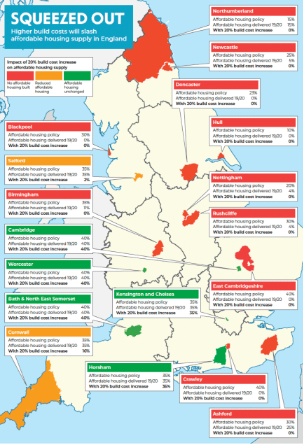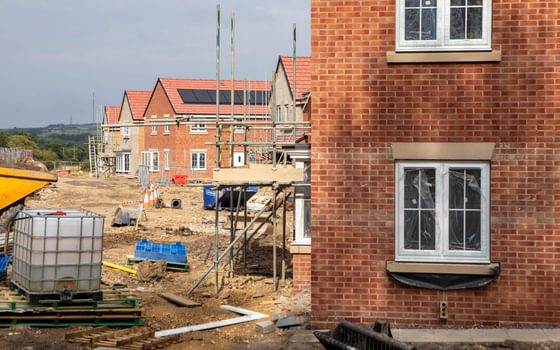Squeezed out
The impact of build costs and planning reform on social housing supply in England
01 December 2021
Even in benign conditions for housebuilding, the current planning system cannot provide the social and affordable homes communities need. But housebuilding is not enjoying benign conditions. The country is currently experiencing escalating build costs because a host of international and domestic events have disrupted labour markets and supply chains. As the full economic consequences of the pandemic feed through, it is highly unlikely that recent housing market price trends will be sustained in much of the country. Build costs are likely to continue rising while demand for housing cools. As a result, there is now a pressing risk that many current and planned housing schemes will become unprofitable for developers, and that social and affordable homes on these schemes will be flipped to market housing to meet profit expectations and so ensure building goes ahead.
New research from NEF, working with Altair Ltd as viability and financial modelling partners, analyses a sample of local authorities, two from each region of England, to test the resilience of social and affordable housing supply to further increases in build cost. In every region, social and affordable housing supply is at risk. In the south and east of the country, 3 out of 8 councils in our sample – Ashford, Crawley and East Cambridgeshire – risk seeing no social and affordable housing delivered through Section 106 (S106) of the Town and Country Planning Act 1990, the planning mechanism used to require social and affordable housing in market-led schemes. Meanwhile, Cornwall risks seeing delivery slashed from 35% (the level required by council policy and delivered in 2019 – 20) to 16%. This is despite house prices being above the national average in all these places.

However, the risks for councils in the north and midlands are of a different order of magnitude. Eight of the ten councils in our sample from these regions would see social and affordable housing supply through the planning system eliminated in the event of continuing build cost increases. In Newcastle, Northumberland, Blackpool, Doncaster, Hull, Birmingham, Nottingham, and Rushcliffe, every social and affordable home that would usually be required through the councils’ S106 policies would need to be converted to market-sale housing, just to meet profit expectations of land traders and developers and so ensure schemes are built out. In Salford, protecting profit levels would allow just 2% of homes to be built as social and affordable housing, reduced from the 35% required by policy and delivered in 2019 – 20. The collapse of social and affordable housing delivery through S106 would remove from these communities a vital tool for supporting their recovery from the ravages of the pandemic and would undermine levelling up ambitions.
The government must act to reform the planning system in England to address the long-term undersupply of social and affordable homes in communities across the country, as well as the short-term risks to affordable supply from rising build costs. This means increasing the supply of land entering development at the right price for building many more homes that are affordable in relation to local incomes – above all social rent housing.
Unfortunately, what we have seen so far of the government’s plans for reforming this system – in the form of the 2020 Planning for the Future white paper – is deeply concerning for the future delivery of social and affordable housing. The white paper suggests a huge range of ambitious changes to development standards that would further increase build costs, without suggesting any way of changing the price at which land enters development. Instead, the white paper suggests putting social housing supply further at risk by standardising the practice of flipping social and affordable homes to market homes to protect profit levels from the impact of rising build costs or lower-than-expected house prices.
Fortunately, the new Secretary of State for the Department for Levelling Up, Housing and Communities, Michael Gove, has paused plans for a Planning Bill to reconsider what form this should take. We urge the government to consider NEF’s recommendations to ensure a revamped planning system will deliver the homes communities want and need. This can be done first by improving the design of the proposed Infrastructure Levy to maximise social and affordable housing supply, using early delivery of affordable rented tenures through the levy to de-risk development on market-led schemes. Second, more ambitious social housing policies should apply to land in public and charitable ownership, backed up by changes to law and guidance to ensure public and charitable landowners can put their land into social-housing-led schemes. Third, the Land Compensation Act 1961 should be amended to incentivise private landowners to sell their land at values that make ambitious, sustainable, well-designed, locally affordable housing schemes possible, backed up by improved HM Land Registry data.
Image: iStock
Campaigns Homes For Us
Topics Housing & land








